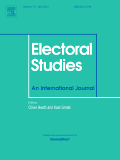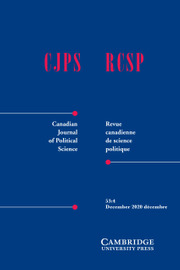New podcast episode
In this episode, Ruth Dassonneville talks with Diane Bolet about her research on the role of context-level factors for explaining the electoral success of radical right-wing parties. Read more
In this episode, Ruth Dassonneville talks with Diane Bolet about her research on the role of context-level factors for explaining the electoral success of radical right-wing parties. Read more
Alexandra Jabbour is one of the winners of the prize for the best presentation at the CSDC student conference. At the conference, that took place online on 18 and 19 March 2021, Alexandra presented her paper “The Negative Implications of Cohabitation Between Working Age Children and Parents on Political Opinions.” Here’s an abstract of the […] Read more

Philippe published an article in Electoral Studies. In his paper, Philippe uses data from the Making Electoral Democracy Work project to study the determinants of the accuracy of voters’ expectations about the outcome of elections. Abstract The expectations of voters regarding election outcomes appear to be mostly influenced by their own political preferences. This raises […] Read more

Maxime co-authored a paper that is forthcoming in the Canadian Journal of Political Science. The paper, entitled “Fulfilling Campaign Promises or Following Public Opinion: Does the Size of the Majority Matter?” uses the data from an experiment that was conducted collectively with undergraduate students enrolled in Prof. André Blais’ course on experiments. Abstract We perform […] Read more
Semra Sevi published two datasets that she has put together during her doctoral research. These original datasets include information on all candidates who ran in Canadian federal and Ontario provincial elections from 1867 to 2019. The data have been deposited on Harvard Dataverse and can be accessed here. Semra also published a short article introducing […] Read more
Amanda Léal published an op-ed (co-written with Abir Samih) on the topic of misinformation and “fake news”. You can read the article here. Read more
Dans cet épisode du balado, Jeanne Marlier, étudiante à la maîtrise au département de science politique, discute avec Valérie-Anne Mahéo, professeure de science politique à l’Université Laval. Valérie-Anne est spécialiste de l’opinion publique, de la participation politique et de l’engagement politique des citoyens. Valérie-Anne a publié un article qu’elle a co-écrit avec Éric Bélanger qui […] Read more
L’association étudiante des cycles supérieurs de science politique (AECSSPUM) est à la recherche de mentor.es pour cette session qui seront jumelé.e à un nouvel étudiant inscrit ou à une nouvelle étudiante inscrite aux études supérieures en science politique. Les rôles des mentor.es sont : 1) Aider à l’intégration de son mentoré.e dans son nouveau programme d’étude et 2) Répondre […] Read more
18 February 2021 • 11h30 18 February 2021 • 13h00
Zoom
Many disciplines in the social sciences face a ‘credibility crisis’. In response to such crises, the Open Science movement is promoting research practices that are more transparent. In political science, there is a clear trend towards more transparent and replicable research. More and more journals are requiring the pre-registration of experimental work and a few […] Read more
19 January 2021 – Can Party Id be a Proxy? The Measure of Party Ideology with Party Identification Nadjim Frechet (Université de Montréal) 26 January 2021 – Social Norms and Electoral Participation: Doing what is right or doing like everyone else Maxime Coulombe (Université de Montréal) 2 February 2021 – Evaluating Performance in […] Read more